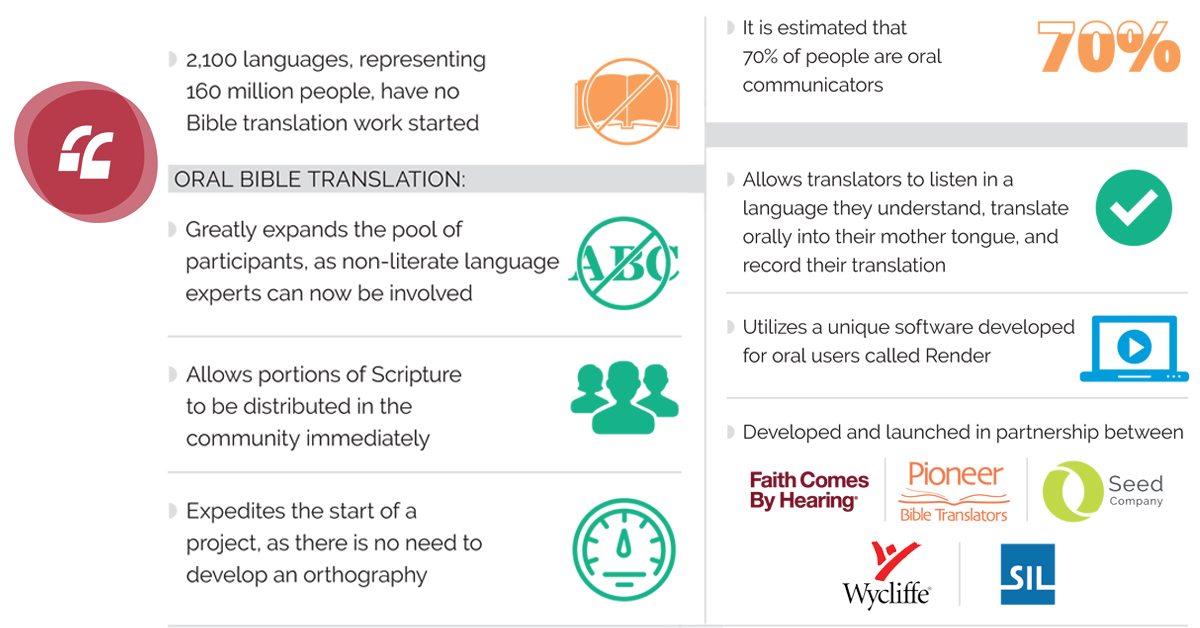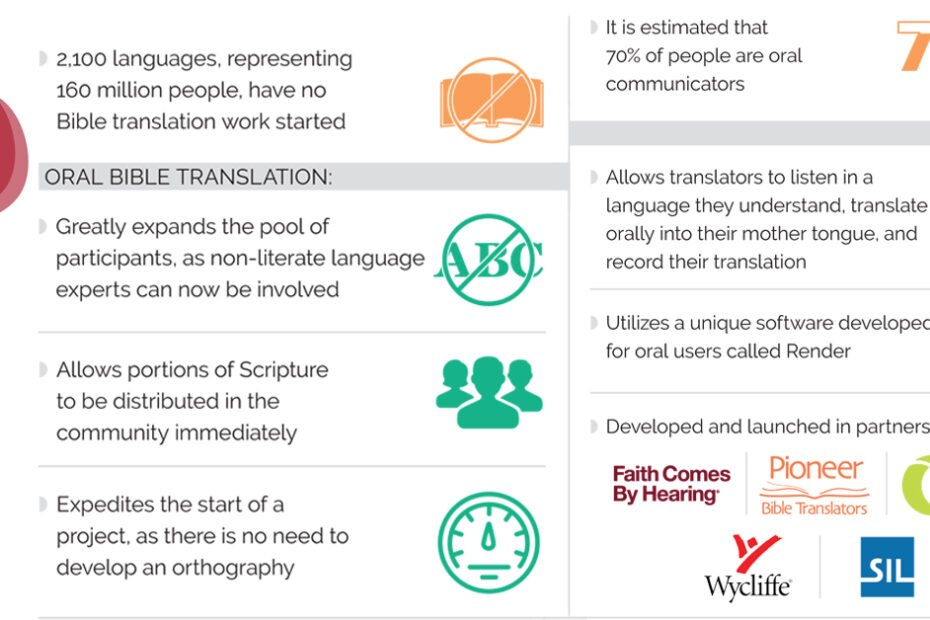Oral communicators account for 70% of the world’s population. Many of them do not encounter situations in their daily life when they need to read or write. Using their rich oral tradition, they sing, tell stories, pass down history and teach skills to the next generation. There are over a thousand oral cultures in the world today, whose languages have not been written down. The Apostle Paul said, “There are doubtless many different languages in the world, and none is without meaning.” (1 Corinthians 14:10) Yes, oral languages are meaningful, and significant.
It takes years of language study and analysis before even a Bible translation team can start translating in these languages using traditional methods. Even if the Bible is finally translated, only the literate few will be able to encounter the Word of God. It will remain unreachable for the majority of people speaking these languages. Oral Bible Translation overcomes these hurdles and engages millions of people with the Word of God.

Faith Comes By Hearing is a ministry committed to provide God’s Word through audio recordings for non-literate and oral preference people of the world. This organization, which is firmly rooted in the belief that faith does indeed come by hearing, has recorded the Bible in over 1,450 languages of the world and makes them available free of cost. The leadership of Faith Comes By Hearing considered the implications of using oral Bible translation to expedite providing the Word of God to all the remaining languages of the world. They collaborated with prominent Bible Translation agencies like SIL International, Pioneer Bible Translators and Seed Company. Over three years’ time, they developed specialized software for oral translation called Render. Render is easy to use by people of all languages and helps translate Scripture without skipping any necessary steps. Color-coded icons lead translators from one stage of translation to another. (https://renderpartners.com/)

What is Oral Bible Translation?
It is translating orally after listening to an Audio Bible recording. Reading this, you might ask, “Can teams translate the Word of God correctly if they just listen and translate orally?” Absolutely, they can! To understand how this is possible, let us walk through the stages involved in Oral Bible Translation.
Translators listen to the Audio Bible in one or two languages they understand well. Each book of the Bible is divided into small meaningful units called sets in the Render software. For example, Luke’s Gospel is divided into 79 sets. Once the translators listen to a set carefully, they study the meaning of the passage with the help of literate Translation Advisors. They work hard to internalize the passage using techniques like kinesthetic learning, drama/skit, story-board etc. This is not memorization, but internalization–getting deep into the meaning and emotions of the passage and putting them into their minds. One oral translator in Africa says this about the process of internalization, “Now I am a walking Bible!”
Once they internalize the passage, translators orally translate and record the passage. They record it many times until they are satisfied with their translation. Then they compare it with the passage in the source language Bible to ensure the translation is correct. The other translation team receives the recorded passage through Render. They listen and record their recommendations and suggestions, and send it back to the translators. This process goes on until everyone in the team accepts the translation.
After the team completes the initial translation, several people in the language community help/check to discover if the meaning is clear, and the language natural and pleasing. Once their recommendations are included, the passage is translated into the source language (called back translation) and sent to a Bible Translation Consultant through Render. The consultant listens to the translation and the back translation, then communicates his/her recommendations to the team. This process repeats until the consultant and the team are satisfied with the translation. As soon as the consultant approves a Scripture portion, it is made available to the language community through a variety of media. People listen to the Scripture through their mobile phones and social media.
God has given me the opportunity to work with the Koch people of Bangladesh to translate the Word of God. In the past, many people tried to reach the Koch community with the Gospel, but they were not interested even to listen. Now they listen to orally translated Scripture with great interest and communicate eagerly with the translation team about the Gospel. I believe that on the day when people from all nations, languages, and tribes praise God in heaven, there will be many Koch-speaking people there. Not only Koch, but also people from all oral cultures from all over the world will sing praises to God.


Pingback: One Matchstick - The Senga Fire - EMDC Blog
Two EMDC sessions on this topic of Oral Bible Translation were just presented !!
For those who are members of EMDC, here they are described, along with direct links. 🙂
Class Title: Oral Bible Translation: Using Render
Class Archive: https://emdc.online/archive/285
Description: Come see a demonstration of Render, an oral Bible translation software. Render supports oral translation by focusing its design on nonliterate translators. The software is iconographic and color-driven, guiding the user through each step of the Bible translation process. It also acts as a workflow management tool, keeping track of every audio file and updated draft. Those involved in getting Scripture to oral people groups may find Render to be a helpful tool. Learn more about Render at https://renderpartners.com/
———————————————————–
Class Title: Oral Bible Translation: Consultant Checking
Class Archive: https://emdc.online/archive/286
Description: What are the similarities and differences in checking a written translation project and checking an oral translation project? Are there details that need extra attention from a consultant for orally translated Scripture? Is going through a written Back Translation sufficient to get the real feel of Oral Bible? Join me in taking a look at Oral Bible Translation through the eyes of a consultant.